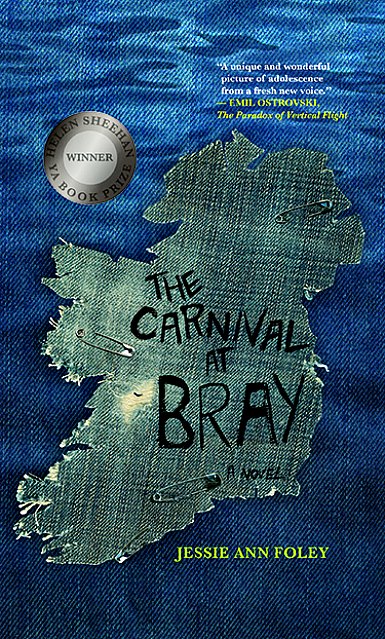'The Carnival At Bray' Facilitates Important Conversations, Ignores Feminine Power
By Jaclyn Bauer in Arts & Entertainment on Sep 2, 2014 4:40PM
 Jessie Ann Foley, Columbia College alum, CPS English teacher, and Chicago native, is to release her first novel, The Carnival at Bray, published by Elephant Rock, this October, 2014. The Young Adult (YA) novel takes place mainly in Chicago and Ireland during the grunge era of Nirvana worship and flannel shirts, and even includes cameo appearances by The Smashing Pumpkins and Nirvana.
Jessie Ann Foley, Columbia College alum, CPS English teacher, and Chicago native, is to release her first novel, The Carnival at Bray, published by Elephant Rock, this October, 2014. The Young Adult (YA) novel takes place mainly in Chicago and Ireland during the grunge era of Nirvana worship and flannel shirts, and even includes cameo appearances by The Smashing Pumpkins and Nirvana.
At the beginning of the novel, 16-year-old protagonist Maggie has just moved to Ireland with her younger sister Ronnie, her mother Laura and her mother’s latest lover Colm. In a strange new land with no friends, Maggie longs for the familiarity of Chicago’s Jefferson Park neighborhood, the smell of her grandmother’s cooking, and the love of her deadbeat uncle Kevin.
The novel’s themes are typical for the YA genre, and include issues of growing up, first sexual experiences, drug experimentation and family dysfunction among others. However, as a self-proclaimed proud feminist and equal rights advocate, I sometimes wanted to tear out the virtual pages of my e-book in anger.
At one point during a bar fight, Foley describes how “the men at the counter yelled encouragement while the women shrieked at them to stop.” The women shrieked, like banshees or helpless bystanders, while the men jeered like sniveling idiots: how typical.
Later, when Maggie falls for the town football star Eoin, she finds herself needing him to take care of her, and Foley positions their relationship so that without this prince charming coming to Maggie’s rescue, the novel would never have gone anywhere. And while I recognize that this is a common dream for young women, I find it the responsibility of older, more confident women to help debunk the Prince Charming myth.
Yes, women can accept help, and friendships go a long way in aiding and guiding a person through life, whether they are sexual friendships or not, but for Eoin to make his appearance before the crying, distraught, Maggie right at the exact moment she needs him is a little bit too Snow White-subjugation for me.
Again, adopting typically male-associated ideologies, Eoin also wants to “kick [peoples] asses” in the name of his girlfriend whom he must protect, while Maggie’s number one quality is trying not to cry. This is not to say that either character doesn't hold any qualities of the inverse: Eoin is often characterized as sensitive and shy, and Maggie can definitely make a stand for herself now and again. However, none of these less prominent traits are able to shadow over the characters' more typical behaviors and ideologies.
At one point, Maggie is said to “love that [Eoin] is so stubbornly himself” and doesn't pretend to be anything he is not just for Maggie’s sake. Later, when offered cocaine by two Nirvana fans at a concert, Maggie is grateful that Eoin passes the offer by so that she too can say 'no.' She wonders if “Eoin had accepted the drugs, what would she have done” Discussing young women’s overall lack of self-confidence is an important and necessary conversation to have, but perhaps we, as writers, can give young women a stronger female hero to follow by example, rather than showing a weak kneed, love-stricken mess of a female beside a strong and confident male.
Many other rites of passage take place for Maggie throughout the novel, including the first time she ever gives a boy a blow job, an unfortunately typical experience as it happens for Maggie. Maggie also undergoes relationship and dating hardships which I, at 24, am still experiencing, such as ‘why won’t he kiss me?’ and ‘does he actually have feelings for me?’ She smokes pot for the first time, drinks whiskey, smokes cigarettes and has sex, but WITHOUT a condom or protection of any kind…
Overall, I think that Foley addresses a lot of important issues for young women including peer pressure, dealing with the death of a loved one, navigating the waters of teenage self-confidence and first time sexual experiences. She does a good job of demonizing characters whose values young women shouldn’t follow including the druggies, runaways and smokers; however, Foley’s overall portrayal of women in the book is, unfortunately, not the most inspiring.